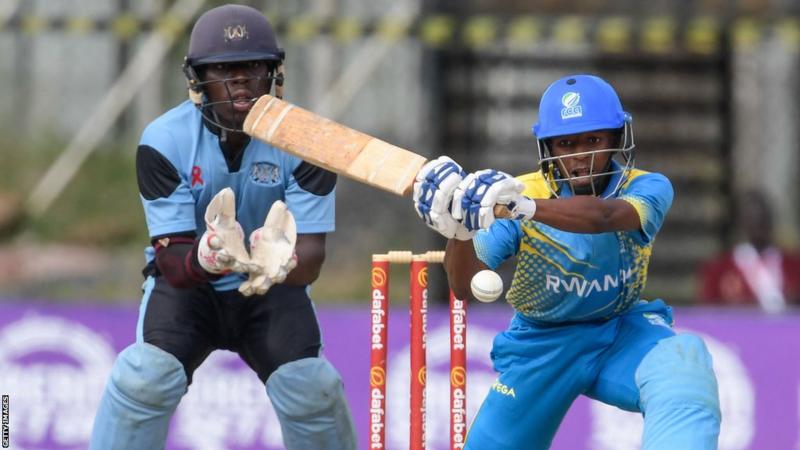Rwanda captain Clinton Rubagumya distinctly remembers the bellows from a previous national team coach as the country’s best cricketers repeatedly turned their head in the opposite direction during fielding practice.
“Why aren’t you looking at the ball?” the coach demanded. “But for us to survive, we had to play this type of way,” says Rubagumya.
Experience had necessitated a raft of idiosyncrasies upon Rwanda’s players.
Growing up only able to play cricket on dirt football pitches, a number of them had lost their front teeth courtesy of a ball hitting a rough patch and ricocheting dangerously upwards.
“So you learned to collect it with your face looking away,” explains Rubagumya.
He still remembers his first thought upon arriving for a match in South Africa a few years ago – his debut game outside of Rwanda: “This is a carpet! How can you get injured here?”
Few roads in qualification for the 2024 T20 World Cup have been as rocky or steep as that of Rwanda’s, the lowest-ranked side still in with a chance of competing in next year’s showpiece.
General view of Gahanga International Cricket Stadium
The Gahanga International Cricket Stadium is one of the best of its kind in the wider region
Barely more than two decades ago, the sport did not exist in the country.
Before the horrifying 1994 genocide that saw 800,000 people – predominantly members of the minority Tutsi tribe – killed in 100 days, Rwanda was part of Francophone Africa, a bloc of French-speaking countries.
As numerous Rwandan refugees then returned from exile in English-speaking, cricket-playing countries like Kenya, Tanzania and Uganda, the country’s leaders began a process of shedding its colonial past.
Over the years, Rwanda would become increasingly English – eventually joining the Commonwealth in 2009 – and what sport was more appropriate to solidify that relationship than cricket?
Yet such was the rudimentary nature of the cricketing landscape that until 2017, the only playing facility was located on the site of one of the biggest genocide massacres, with human bone fragments invariably found on the outfield.
The dizzying upwards curve to the cusp of a landmark global event began at the start of that decade, with the formation of a UK-based charity to raise money for the first international-standard stadium in the country.
At that point, recalls star batter and former captain Eric Dusingizimana, there were only 50 cricketers spread across three clubs. Now 24 clubs feature the best of tens of thousands who play across the country, with cricket increasingly taught in schools. “It’s a very, very big difference,” he says.
Dusingizimana’s role in the evolution has been greater than most. In May 2016, he broke the Guinness world record for the longest individual net session at a fundraiser for the stadium, which saw him face deliveries from the likes of Tony Blair and the reigning Miss Rwanda in a 51-hour marathon.
“It was incredibly hard but I did it for the cause,” he says. “I started at 8am on Wednesday and finished at 11am on Friday. After that I went home and slept for almost four days.”
The result was the world-class Gahanga International Cricket Stadium, built on the outskirts of the capital Kigali, which has been central to the huge shift in the country’s cricketing fortunes.
The stadium now regularly hosts international tournaments and Rubagumya says the attention he receives is incomparable even to recent years.
“Three or four years ago I would walk around with my kit and people would ask if I was playing tennis or golf,” he says. “Now I meet people and they say: ‘Oh, you are a cricketer’. People are starting to get the hang of the game.”








